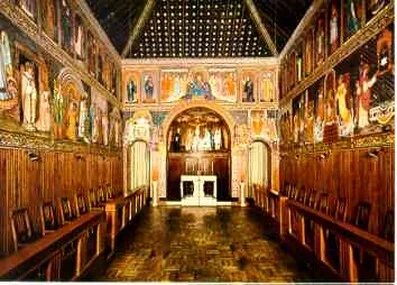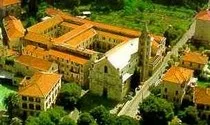the choir
11
THE CHOIR
When the signal of Opus Dei is given, the Lord's hand calls all the monks to gather in the choir. But really they have always been called in the only spiritual temple that is Christ himself; therefore, first of all, they are called to enter into the depth of their own being, that it's the true temple of the Holy Trinity, where Christ, divine liturgist, celebrates unceasingly his mysteries of salvation.
Each time that they are called to prayer, the move to do immediately is not therefore only the external one of leaving all the rest and go, but also the inner one, that is penetrating into the sanctuary of their own heart, to find the area of silence, the contact with the Invisible, with God.
From this, the need of silence.
If with the signal of Opus Dei, they are not yet entered into true silence, easily they enter the choir dragging behind themselves some noise!
The order and the way in which the liturgy of the hours is been said- alternating singing, listening, silence- on the rhythm of the diurnal and nighttime hours, according to the liturgical times and the seasons, it points out the narrow correspondence

In the monastery chapel of Finalpia,
the choir is a feast for the eyes of those visiting it
and a joy for the inner eyes of who pray there.
The mysteries of the liturgical year
represented by angelic characters
(with CHRIST in the center of the Paschal Mystery)
and the solemn procession of Saints
(with Holy Mary in the center)
they introduce in an atmosphere that recalls to the mind the
celestial Liturgy of the Apocalypse.
that intervenes between the rhythm of the time and the vital rhythm of the man, whose existence must flow into eternity by means of "breathing" that is prayer. As Abbot Anthony recommended to the first disciples of the desert: Christum semper respirare (breath Christ always)
Because Christ is the true day, while the monks run behind the hours of natural light, visible to our bodily eyes, they run also behind the day that is Christ himself, and they are introduced into the never ending light that now they could only see with the eyes of faith. The solar day is in fact a sign of the true light, that is Christ; therefore each day, celebrating Opus Dei, the monks walk in procession behind the Lamb, passing from Hour to Hour - like from hill to hill - in the kingdom of heavens. In this way the hour of this world move into eternity, we insert our praise, which resounds in time, in praise that resounds indeed incessantly in the assembly of the celestial Jerusalem.
The awareness that the choral liturgical prayer is joined with the celestial liturgy must comfort because the fragility and the incapability of the monks, they are supported by the perfect harmony of the choir of angels and saints. The notes the monks can't reach, they can, and they also make up for the small fervor of whoever prays in choir.
An ancient abbot (Doroteo of Gaza) told that before pronouncing any word, doing any liturgical gesture, you need to "throw your own impotence in God." When you get ready to pray, you need to remember therefore, to throw your own impotence in God and simply let be taken from his goodness, grabbed by the power of his Spirit that could pray in us really as we should pray, according to God.
It is not the case to be dismayed not even if sometimes we go to prayer with a state of mind a little bit dejected: it's human to be subject to these alternations of serenity and of anxiety. We need however to have always the conviction that we are the place of prayer of the Holy Spirit. He prays well also when we are tired or a little bit depressed.
The monk's care should therefore aim to set out himself like a pleasant place, most possible clean, orderly, not encumbered of things that are incompatible with the holiness of God, of the praying Guest.
Above all, take care of purity of mind and of heart, and on the other hand accept your own limits. Also the monks are however beginners in praising God, but they are supported, as already said, by the choir of the celestial Jerusalem.
The choir is structured so that is formed like a team, like a brotherly phalanx of support.
The monks can therefore count, not only, on the support of the eldest brothers already singing in heavens, but also on the support of those ones, who live, itinerant on earth, close to them and praying with them in the same choir. The fervor of such brothers, the holiness of their prayer, the purity of their search for God, is of help and comfort.

